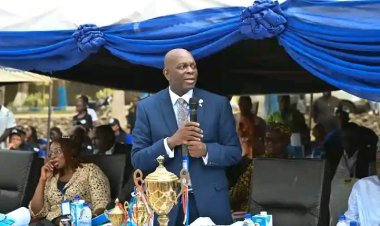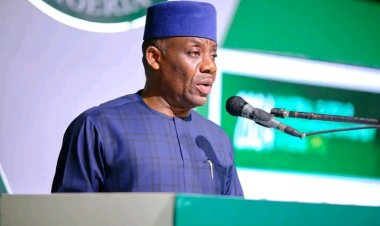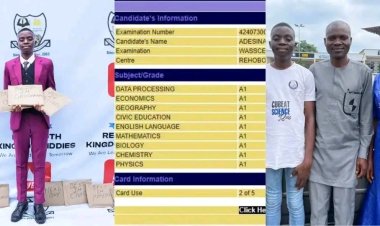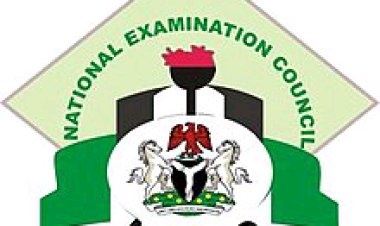Federal University Otuoke (FUOTUOKE) 13th Inaugral Lecture Series
The 13th Inaugural Lecture at Federal University Otuoke delved into pressing concerns regarding humanity’s impact on the environment, exploring whether our actions will lead to prosperity, decline, or catastrophe.
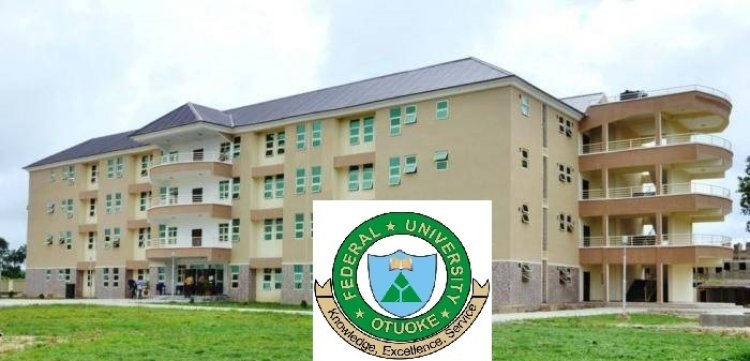
The 13th Inaugural Lecture at Federal University Otuoke delved into pressing concerns regarding humanity’s impact on the environment, exploring whether our actions will lead to prosperity, decline, or catastrophe.
Read also: NUC E–Learning Assessment Team Arrives FUOTUOKE, Presents Report
The lecture was titled “Environment – Man’s Boom, Gloom or Doom? An Environmental Biology and Toxicology Perspective,” the event held at the main auditorium of the East Campus, presided over by Vice Chancellor Professor Teddy Charles Adias.
Professor Adias expressed his pleasure at participating in the esteemed academic tradition, noting its role in uniting scholarly minds. He eagerly awaited the 13th Inaugural Lecture, anticipating profound insights that would distinguish both the Lecturer and the University.

Highlighting society’s growing concerns for sustainable living, Professor Adias underscored the lecture’s theme, “Environment – Man’s Boom, Gloom or Doom? An Environmental Biology and Toxicology Perspective,” as a testament to Professor Enetimi Idah Seiyaboh’s expertise in the field.
The audience was eager to delve into Professor Seiyaboh’s academic journey and gain foundational insights into environmental challenges and opportunities, expecting a captivating discourse.
Professor Seiyaboh emphasized the pivotal role of the environment in sustaining life on earth during his lecture. He extensively discussed the diverse components of the environment, ranging from biotic to abiotic factors, and explored various types of environments such as aquatic, terrestrial, and atmospheric realms.
Read also: FUOTUOKE Admits Over 4,000 Students at 12th Matriculation Ceremony
He particularly underscored the crucial distinction between the environment and an ecosystem, noting that the former pertains to the surroundings while the latter signifies the intricate interplay between the environment and living organisms. According to him, the environment encompasses the habitat where organisms reside, whereas an ecosystem represents a dynamic community where biotic and abiotic elements interact harmoniously.
Professor Seiyaboh, in his evaluation of environmental impacts, highlighted the significance of considering factors such as climate change, encompassing global warming, acid rain, and photochemical smog, along with other forms of pollution. He also pointed out concerns such as ocean acidification, the displacement and extinction of wildlife, and the depletion of essential resources like forests, water, and food. He emphasized that these adverse impacts are of paramount concern to humanity.
In the context of his lecture theme, “Environment – Man’s Boom, Gloom, or Doom,” Professor Seiyaboh, drawing insights from environmental biology and toxicology, made reference to biblical narratives regarding the creation of the Garden of Eden.
Read also: FUOTUOKE Empowers Teaching Staff with TETFund Special Intervention Workshop
He noted how initially, God entrusted man with stewardship over this pristine environment, marking a phase of “boom” in human existence, as everything was in harmony and deemed good. However, man’s actions led to disruptions in the Garden’s equilibrium, resulting in a period of “gloom” characterized by discord and environmental degradation. This degradation, both in ancient times and the present era, has brought about a state of “doom,” showcasing the challenges and negative consequences faced in managing and preserving the environment.
A central focus of Professor Seiyaboh’s lecture was the imperative of environmental pollution control and monitoring, along with identifying indicators of environmental and ecological change. He contextualized these discussions against the backdrop of the harsh realities experienced in the Niger Delta region. Specific references were made to issues such as the bioaccumulation of aromatic hydrocarbons in blue crabs, the impact of dredging on water quality in Igbedi Creek and Upper Nun River, and various other instances of environmental degradation in the area.
In addition, he investigated the acute toxicity of Clarias Gariepinus fingerlings when exposed to 2,4-D Dimethylamine salt, as well as the impact of Lambda on Transferases, urea, and Creatinine levels in the organs of Parohiocephalus Obscurus, a prevalent wetland fish in the Niger Delta region, among other research topics.
The inaugural lecture was both highly informative and engaging in its delivery and rhythm.

